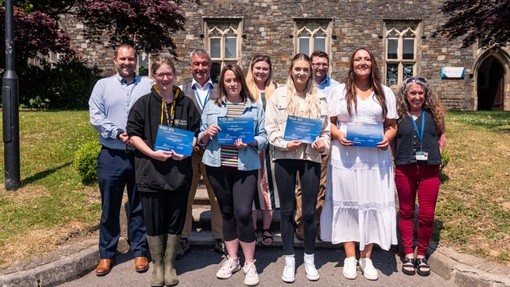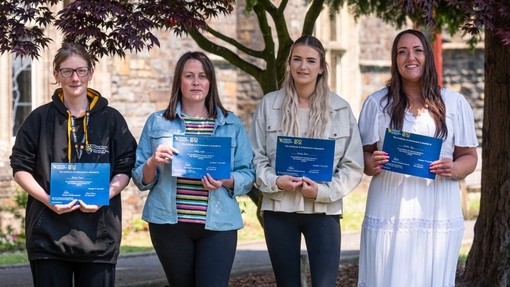UWTSD Celebrates Peer Assisted Learning at an Award Ceremony
Students from The University of Wales Trinity Saint David (UWTSD) have been recognised at a special ceremony to celebrate their contribution to the Peer Assisted Learning mentor scheme.

The Peer Assisted Learning (PAL) mentor scheme at UWTSD aims to enhance the first-year student experience, by easing the transition to university, supporting student retention, and providing opportunities for second- and third-year students to develop their graduate attributes.
The scheme hosts weekly drop-in sessions for first year students (both face to face and online) run by second- and third-year students, in order to create welcoming and friendly learning communities around specific programmes of study. First year students can discuss their course work with trained and supervised second- and third-year students who understand the challenges posed by their programme of study. Academic staff are not present at the sessions.
Peer learning schemes such as PAL are now an integral part of student university life in Higher Education Institutes across the globe.
Christopher Fleming, PAL supervisor at UWTSD said:
“A substantial body of research shows that such schemes can improve retention, enhance the student experience, develop graduate attributes, and improve grades. Opportunities to meet with peers, both in the same year (horizontal interaction) and from higher years (vertical interaction) increases students’ engagement with, and sense of belonging to, their Higher Education Institution, a critical aspect of retention.”
Rhys Dart, Director of Student Services at UWTSD said:
“Support and guidance are a crucial element of the student and the academic experience at UWTSD. We offer a full range of support services at the University but there are always barriers preventing people from accessing services.
“It is fantastic to have students willing to give others their time and the benefits of their experience. Hopefully, the experience has been beneficial for yourselves and your own development as well as for the students that they have mentored.
“A key feature and strength of peer learning is your approachability and availability. I know also that in order to be in a position to act as a peer mentor you have had to commit to a comprehensive training programme so that you can appropriately identify wider issues and refer students into appropriate additional support as required.
“I’d also like to take this opportunity to say thank you and congratulations to the Pal team, and to all academic programme staff who have engaged in this Pilot year of the programme.”
Many students have benefited from the scheme and feel that it has helped them with their development both as a student, and as an individual. Christine Joy, PAL Mentor in Business adds:
“I have really enjoyed learning new skills and putting them into practice, this has given me a boost and encouraged me to seek progressing into a formal teaching postgrad degree. I have built confidence in my skills and every session I learn something new and constantly adapt the way I run the sessions, so the student gets the most out of PAL.”
Kirsty Wright, PAL Mentor in Sociology/ Advocacy mentioned:
“I can definitely say that I have gained a massive amount of confidence in my own abilities by becoming a PAL mentor, which was one of the main things I hope to gain!”
Jessica Rowe, PAL Mentors in Sociology/Advocacy felt that the experience has “certainly been worth the effort we have put in so far, especially when we see that what we are doing is helping the students – it is evident that our confidence, and that of the students who have attended, have grown together. The experience has also helped to solidify the knowledge I gained in my previous year of study.”
Jo Kelleher, UWTSD PAL Supervisor said:
“The PAL Supervisor team at UWTSD would like to extend our warmest thanks to the PAL mentors we’ve worked with over the last year. It has been a pleasure working with you, and none of this would be possible without you. We have been particularly impressed with how you’ve used the training and your experience to help new students settle into university life and build your own learning communities. We hope you enjoyed the celebration events, and we wish you all the best for the future.”

